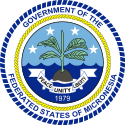 |
|---|
A 26-part constitutional referendum was held in the Federated States of Micronesia on 2 July 1991. [1] Only four of the proposals to amend the constitution were approved by voters.
 |
|---|
A 26-part constitutional referendum was held in the Federated States of Micronesia on 2 July 1991. [1] Only four of the proposals to amend the constitution were approved by voters.
| # | Proposal | Outcome |
|---|---|---|
| 1 | Four year term of office for Congress members | Rejected [2] |
| 2 | List of judges with special responsibilities | Rejected [3] |
| 3 | Powers of the Supreme Court | Rejected [4] |
| 4 | Constitutional amendments by simple majority in each state | Rejected [5] |
| 5 | Clarification of the term of office of the President | Rejected [6] |
| 6 | Independent Anti-Corruption Prosecutor | Rejected [7] |
| 7 | Co-ordination of government projects with the states | Rejected [8] |
| 8 | Individual states ability to impose additional taxes on import duties | Rejected [9] |
| 9 | No public funds for Congress members | Rejected [10] |
| 10 | Powers for education and social security | Approved [11] |
| 11 | Consent of the individual states for a new civil rights law | Rejected [12] |
| 12 | Repeal of the ban on indefinite leases of land under certain circumstances | Approved [13] |
| 13 | Traditional ownership of land for sub-sea reefs | Rejected [14] |
| 14 | Fifty percent of government revenue transferred to the states | Rejected [15] |
| 15 | Temporary land rights as collateral for loans | Rejected [16] |
| 16 | Exclusive application of Micronesian jurisdiction | Approved [17] |
| 17 | Repeal of facilitated repatriation of former residents | Rejected [18] |
| 18 | Veto of presidential decisions with a three-quarter majority in Congress | Rejected [19] |
| 19 | Restricting Congress to defining only national crime | Approved [20] |
| 20 | Powers of individual states on foreign investment | Rejected [21] |
| 21 | Inconsistencies of local laws with the Constitution; first congressional elections | Rejected [22] |
| 22 | Powers of the President to grant amnesties | Rejected [23] |
| 23 | Liability of all official acts of the states | Rejected [24] |
| 24 | Access of the public auditor | Rejected [25] |
| 25 | Introduction of a chamber of traditional chiefs | Rejected [26] |
| 26 | New title for Chapter I | Rejected [27] |
| # | Section | Old text | New text |
|---|---|---|---|
| 10 | Chapter IX article 2 section r | New section | The following powers are expressly delegated to Congress: (r) to promote education and health by setting minimum standards, coordinating state activities relating to foreign assistance, providing training and assistance to the states and providing support for post-secondary educational programs and projects. |
| 10 | Chapter IX article 3 section c | The following powers may be exercised concurrently by Congress and the states: (c) to establish systems of social security and public welfare, to promote education and health, and | The following powers may be exercised concurrently by Congress and the states: (c) to establish systems of social security and public welfare. |
| 12 | Chapter XIII article 5 | An agreement for the use of land for an indefinite term is prohibited. An existing agreement becomes void 5 years after the effective date of this Constitution. Within that time, a new agreement shall be concluded between the parties. When the national government is a party, it shall initiate negotiations. | A lease agreement for the use of land for an indefinite term by a noncitizen, a corporation not wholly owned by citizens, or any government is prohibited. |
| 16 | Chapter XI article 11 | Court decisions shall be consistent with this Constitution, Micronesian customs and traditions, and the social and geographical configuration of Micronesia. | Court decisions shall be consistent with this Constitution, Micronesian customs and traditions, and the social and geographical configuration of Micronesia. In rendering a decision, the court must consult and apply sources of the Federated States of Micronesia. |
| 19 | Chapter IX article 2 section p | The following powers are expressly delegated to Congress: (p) to define major crimes and prescribe penalties, having due regard for local custom and tradition | The following powers are expressly delegated to Congress: (p) to define national crimes and prescribe penalties, having due regard for local custom and tradition |

Godelieve Quisthoudt-Rowohl is a German politician who served as a Member of the European Parliament from 1989 until 2019. She is a member of the Christian Democratic Union in Lower Saxony, which is a part of the European People's Party. She most recently served as the European People's Party's coordinator of the International Trade Committee (INTA), chairwoman of the UK Monitoring Group of INTA, vice-coordinator of the Committee on Human Rights (DROI) and vice-chairwoman of the Delegation for relations with Canada.
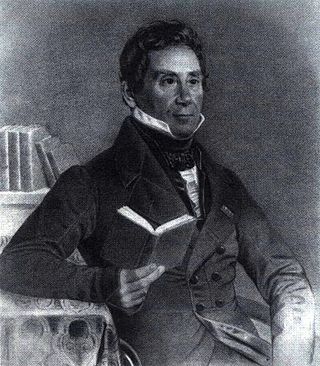
Karl Friedrich Nebenius was a Baden minister and author of their 1818 constitution.
Karl Albrecht Schachtschneider (born 11 July 1940, in Hütten bei Gellin, Province of Pomerania, Germany is a Professor Emeritus in Public Law at University of Erlangen in Nuremberg, Germany.

Lutz Rathenow is a dissident German writer and poet who was haunted by the Secret Police until the German reunification. From then on, his fortunes changed, and he received several literary honors and awards.
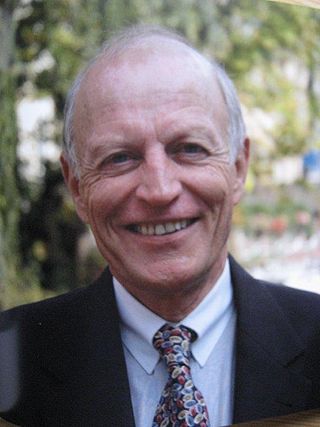
Dieter Mahncke is a scholar of foreign policy and security studies, and Alfried Krupp von Bohlen und Halbach Professor Emeritus of European Foreign Policy and Security Studies at the College of Europe. He is the author of books and articles on European security, arms control, German foreign policy, Berlin, US-European relations and South Africa.
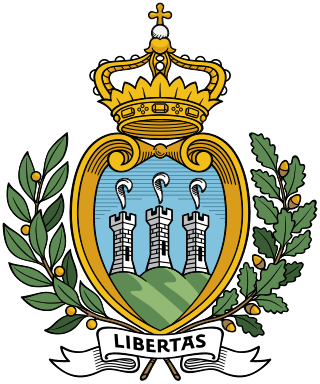
A referendum on repealing changes made to the law on the sale of public property was held in San Marino on 27 March 2011. It was approved by 12,166 voters, passing the 32% quorum of registered voters (10,522) required.

A constitutional referendum was held in the Federated States of Micronesia on 27 August 2002. Voters were asked whether they approved of 14 separate amendments to the country's constitution. To be approved, the proposal required at least 75% of voters in at least three of the four states to vote in favour. Ultimately all 14 proposals were rejected, as none passed the 75% threshold in any state.
A series of four referendums on casinos and senators was held in Guam on 5 November 1996. A reduction of the number of senators from 21 to 15 passed, but proposed term limits for senators failed. Voters approved a measure limiting the budget for parliamentary business to 2.5% of the national budget, and rejected a proposal to permit casinos to open on the island.
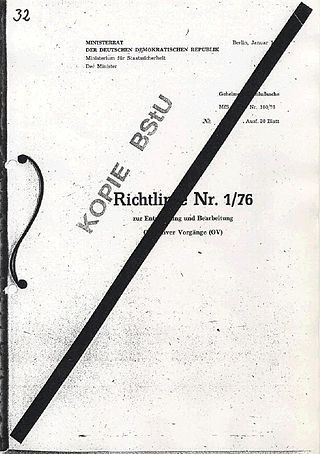
Zersetzung was a psychological warfare technique used by the Ministry for State Security (Stasi) to repress political opponents in East Germany during the 1970s and 1980s. Zersetzung served to combat alleged and actual dissidents through covert means, using secret methods of abusive control and psychological manipulation to prevent anti-government activities. People were commonly targeted on a pre-emptive and preventative basis, to limit or stop politically incorrect activities that they may have gone on to perform, and not on the basis of crimes they had actually committed. Zersetzung methods were designed to break down, undermine, and paralyze people behind "a facade of social normality" in a form of "silent repression".
Zaccaria Giacometti was a Swiss scholar of constitutional law and professor at the University of Zurich.

Helmut Müller-Enbergs is a German political scientist who has written extensively on the Stasi and related aspects of the German Democratic Republic's history.

The Meldorfer Gelehrtenschule (MGS) is a Highschool in Meldorf in the county Dithmarschen in Schleswig-Holstein. The school was founded as a Latin school in 1540. The School authority is the county Dithmarschen. As of 2014 there are 60 teachers and 886 students in 35 forms.
Gerd R. Ueberschär is a German military historian who specialises in the history of Nazi Germany and World War II. He is one of the leading contributors to the series Germany and the Second World War and, together with Rolf-Dieter Müller, is the author of Hitler's War in the East 1941−1945: A Critical Assessment. Both works have been published in English translations.

Hofmann GmbH Maschinenfabrik und Vertrieb is a family-owned German company, based in Rellingen. That develops, produces and distributes road marking machines. The company was founded in 1952 in Hamburg.
Astrid Mannes is a German author and politician (CDU). From 2017 to 2021, she served as a member of the national parliament ("Bundestag"), directly elected as a member for constituency of Darmstadt.
Livia Anne Richard is a Swiss theater director and author.

A double referendum was held in Uruguay on 25 October 2009 alongside general elections. Voters voted on two proposals: one to abolish the Law on the Expiration of the Punitive Claims of the State, which had granted amnesty for human rights abuses under the 1973–85 dictatorship during the presidencies of Juan María Bordaberry, Alberto Demicheli, Aparicio Méndez, and Gregorio Álvarez, and one to enable overseas postal voting. Both proposals were rejected by voters, with 52% rejecting the revocation of the amnesty law and 62% rejecting overseas postal voting.
Kreishauptmannschaft Leipzig was a Kreishauptmannschaft or administrative district in the Kingdom of Saxony. Succeeding the Leipziger Kreis of the Electorate of Saxony, it was founded in 1835 and continued under the Free State of Saxony until being renamed the 'Regierungsbezirk Leipzig' in 1939, headed by Erich Teichmann (1882-?) as Regierungspräsident. The Kreishauptmannschaft system was abolished in 1943.
Ilsemarie Meyer is a German lawyer, judge and the recently retired president of the Bremen State Court. She has also served, since 2004, as president of the Court of Justice of the Confederation of Protestant Churches in Lower Saxony.
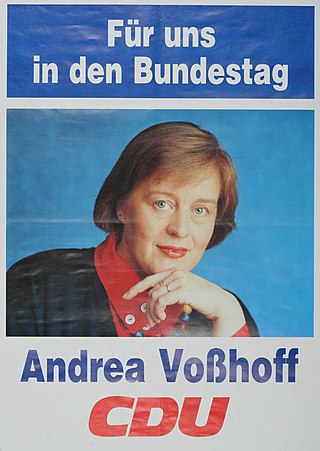
Andrea Voßhoff is a German former lawyer who switched to full-time politics in mid-career (CDU). She served as a member of the Bundestag between 1998 and 2013 when, as a "party list" candidate, she narrowly failed to secure re-election in the Brandenburg-Potsam electoral district.